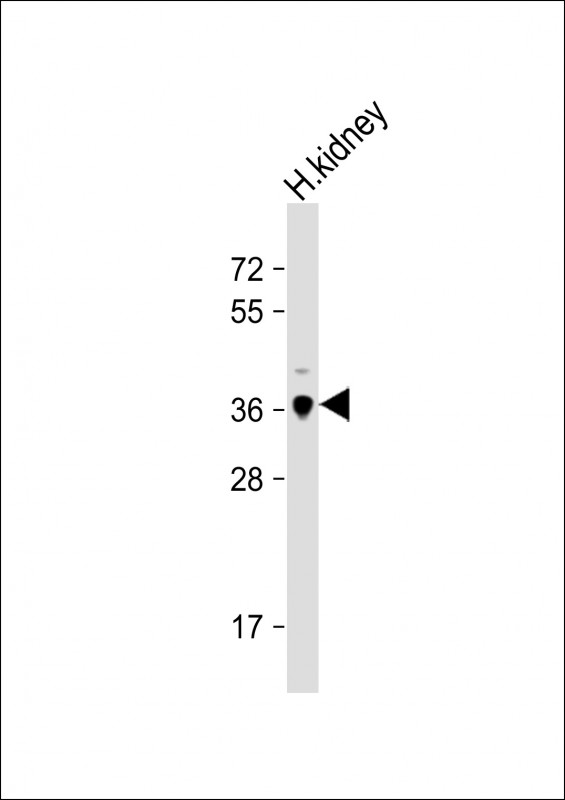LGMN Antibody (N-term)
Affinity Purified Rabbit Polyclonal Antibody (Pab)
- 产品详情
- 实验流程
- 背景知识
Application
| WB, E |
|---|---|
| Primary Accession | Q99538 |
| Other Accession | Q4R4T8, NP_005597.3 |
| Reactivity | Human |
| Predicted | Monkey |
| Host | Rabbit |
| Clonality | Polyclonal |
| Isotype | Rabbit IgG |
| Calculated MW | 49411 Da |
| Antigen Region | 83-112 aa |
| Gene ID | 5641 |
|---|---|
| Other Names | Legumain, Asparaginyl endopeptidase, Protease, cysteine 1, LGMN, PRSC1 |
| Target/Specificity | This LGMN antibody is generated from rabbits immunized with a KLH conjugated synthetic peptide between 83-112 amino acids from the N-terminal region of human LGMN. |
| Dilution | WB~~1:1000 E~~Use at an assay dependent concentration. |
| Format | Purified polyclonal antibody supplied in PBS with 0.09% (W/V) sodium azide. This antibody is purified through a protein A column, followed by peptide affinity purification. |
| Storage | Maintain refrigerated at 2-8°C for up to 2 weeks. For long term storage store at -20°C in small aliquots to prevent freeze-thaw cycles. |
| Precautions | LGMN Antibody (N-term) is for research use only and not for use in diagnostic or therapeutic procedures. |
| Name | LGMN {ECO:0000303|PubMed:30425301, ECO:0000312|HGNC:HGNC:9472} |
|---|---|
| Function | Has a strict specificity for hydrolysis of asparaginyl bonds (PubMed:23776206). Can also cleave aspartyl bonds slowly, especially under acidic conditions (PubMed:23776206). Involved in the processing of proteins for MHC class II antigen presentation in the lysosomal/endosomal system (PubMed:9872320). Also involved in MHC class I antigen presentation in cross-presenting dendritic cells by mediating cleavage and maturation of Perforin-2 (MPEG1), thereby promoting antigen translocation in the cytosol (By similarity). Required for normal lysosomal protein degradation in renal proximal tubules (By similarity). Required for normal degradation of internalized EGFR (By similarity). Plays a role in the regulation of cell proliferation via its role in EGFR degradation (By similarity). |
| Cellular Location | Lysosome. |
| Tissue Location | Ubiquitous. Particularly abundant in kidney, heart and placenta. |
For Research Use Only. Not For Use In Diagnostic Procedures.
Provided below are standard protocols that you may find useful for product applications.
BACKGROUND
This gene encodes a cysteine protease that has a strict specificity for hydrolysis of asparaginyl bonds. This enzyme may be involved in the processing of bacterial peptides and endogenous proteins for MHC class II presentation in the lysosomal/endosomal systems. Enzyme activation is triggered by acidic pH and appears to be autocatalytic. Protein expression occurs after monocytes differentiate into dendritic cells. A fully mature, active enzyme is produced following lipopolysaccharide expression in mature dendritic cells. Overexpression of this gene may be associated with the majority of solid tumor types. This gene has a pseudogene on chromosome 13. Several alternatively spliced transcript variants have been described, but the biological validity of only two has been determined. These two variants encode the same isoform.
REFERENCES
Clerin, V., et al. Atherosclerosis 201(1):53-66(2008)
Liu, Z., et al. Mol. Cell 29(6):665-678(2008)
Oh, J.H., et al. Mamm. Genome 16(12):942-954(2005)
Dusso, A.S., et al. Am. J. Physiol. Renal Physiol. 289 (1), F8-F28 (2005) :
Murthy, R.V., et al. Clin. Cancer Res. 11(6):2293-2299(2005)
终于等到您。ABCEPTA(百远生物)抗体产品。
点击下方“我要评价 ”按钮提交您的反馈信息,您的反馈和评价是我们最宝贵的财富之一,
我们将在1-3个工作日内处理您的反馈信息。
如有疑问,联系:0512-88856768 tech-china@abcepta.com.























 癌症的基本特征包括细胞增殖、血管生成、迁移、凋亡逃避机制和细胞永生等。找到癌症发生过程中这些通路的关键标记物和对应的抗体用于检测至关重要。
癌症的基本特征包括细胞增殖、血管生成、迁移、凋亡逃避机制和细胞永生等。找到癌症发生过程中这些通路的关键标记物和对应的抗体用于检测至关重要。 为您推荐一个泛素化位点预测神器——泛素化分析工具,可以为您的蛋白的泛素化位点作出预测和评分。
为您推荐一个泛素化位点预测神器——泛素化分析工具,可以为您的蛋白的泛素化位点作出预测和评分。 细胞自噬受体图形绘图工具为你的蛋白的细胞受体结合位点作出预测和评分,识别结合到自噬通路中的蛋白是非常重要的,便于让我们理解自噬在正常生理、病理过程中的作用,如发育、细胞分化、神经退化性疾病、压力条件下、感染和癌症。
细胞自噬受体图形绘图工具为你的蛋白的细胞受体结合位点作出预测和评分,识别结合到自噬通路中的蛋白是非常重要的,便于让我们理解自噬在正常生理、病理过程中的作用,如发育、细胞分化、神经退化性疾病、压力条件下、感染和癌症。







